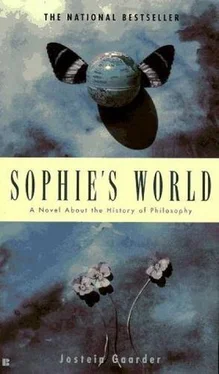Jostein Gaarder - Sophie's World - A Novel About the History of Philosophy
Здесь есть возможность читать онлайн «Jostein Gaarder - Sophie's World - A Novel About the History of Philosophy» весь текст электронной книги совершенно бесплатно (целиком полную версию без сокращений). В некоторых случаях можно слушать аудио, скачать через торрент в формате fb2 и присутствует краткое содержание. ISBN: , Издательство: BERKLEY BOOKS, NEW YORK, Жанр: Философия, на английском языке. Описание произведения, (предисловие) а так же отзывы посетителей доступны на портале библиотеки ЛибКат.
- Название:Sophie's World: A Novel About the History of Philosophy
- Автор:
- Издательство:BERKLEY BOOKS, NEW YORK
- Жанр:
- Год:неизвестен
- ISBN:0-425-15225-1
- Рейтинг книги:4 / 5. Голосов: 1
-
Избранное:Добавить в избранное
- Отзывы:
-
Ваша оценка:
- 80
- 1
- 2
- 3
- 4
- 5
Sophie's World: A Novel About the History of Philosophy: краткое содержание, описание и аннотация
Предлагаем к чтению аннотацию, описание, краткое содержание или предисловие (зависит от того, что написал сам автор книги «Sophie's World: A Novel About the History of Philosophy»). Если вы не нашли необходимую информацию о книге — напишите в комментариях, мы постараемся отыскать её.
Sophie's World: A Novel About the History of Philosophy — читать онлайн бесплатно полную книгу (весь текст) целиком
Ниже представлен текст книги, разбитый по страницам. Система сохранения места последней прочитанной страницы, позволяет с удобством читать онлайн бесплатно книгу «Sophie's World: A Novel About the History of Philosophy», без необходимости каждый раз заново искать на чём Вы остановились. Поставьте закладку, и сможете в любой момент перейти на страницу, на которой закончили чтение.
Интервал:
Закладка:
“As Faust dies and looks back on his life’s work, he says in triumph:
Then to the moment could I say:
Linger you now, you are so fair!
Now records of my earthly day
No flights of aeons can impair—
Foreknowledge comes, and fills me with such bliss,
I take my joy, my highest moment this.”
“That was very poetic.”
“But then it’s the Devil’s turn. As soon as Faust dies, he exclaims:
A foolish word, bygone.
How so then, gone?
Gone, to sheer Nothing, past with null made one!
What matters creative endless toil,
When, at a snatch, oblivion ends the coil?
‘It is bygone’—How shall this riddle run?
As good as if things never had begun,
Yet circle back, existence to possess:
I’d rather have Eternal Emptiness.”
“That’s pessimistic. I liked the first passage best. Even though his life was over, Faust saw some meaning in the traces he would leave behind him.”
“And is it not also a consequence of Darwin’s theory that we are part of something all-encompassing, in which every tiny life form has its significance in the big picture? We are the living planet, Sophie! We are the great vessel sailing around a burning sun in the universe. But each and every one of us is also a ship sailing through life with a cargo of genes. When we have carried this cargo safely to the next harbor—we have not lived in vain. Thomas Hardy expresses the same thought in his poem Transformations’:
Portion of this yew
Is a man my grandsire knew,
Bosomed here at its foot:
This branch may be his wife,
A ruddy human life
Now turned to a green shoot.
These grasses must be made
Of her who often prayed,
Last century, for repose;
And the fair girl long ago
Whom I often tried to know
May be entering this rose.
So, they are not underground,
But as nerves and veins abound
In the growths of upper air,
And they feel the sun and rain,
And the energy again
That made them what they were!”
“That’s very pretty.”
“But we will talk no more. I simply say next chapter!’
“Oh, stop all that irony!”
“New chapter, I said! I shall be obeyed!”
Freud
... the odious egoistic impulse that had emerged in her...
Hilde Moller Knag jumped out of bed with the bulky ring binder in her arms. She plonked it down on her writing desk, grabbed her clothes, and dashed into the bathroom. She stood under the shower for two minutes, dressed herself quickly, and ran downstairs.
“Breakfast is ready, Hilde!”
“I just have to go and row first.”
“But Hilde... !”
She ran out of the house, down the garden, and out onto the little dock. She untied the boat and jumped down into it. She rowed around the bay with short angry strokes until she had calmed down.
“We are the living planet, Sophie! We are the great vessel sailing around a burning sun in the universe. But each and every of us is also a ship sailing through life with a cargo of genes. When we have carried this cargo safely to the next harbor—we have not lived in vain...”
She knew the passage by heart. It had been written for her. Not for Sophie, for her. Every word in the ring binder was written by Dad to Hilde.
She rested the oars in the oarlocks and drew them in. The boat rocked gently on the water, the ripples slapping softly against the prow.
And like the little rowboat floating on the surface in the bay at Lillesand, she herself was just a nutshell on the surface of life.
Where were Sophie and Alberto in this picture? Yes, where were Alberto and Sophie?
She could not fathom that they were no more than “electromagnetic impulses” in her father’s brain. She could not fathom, and certainly not accept, that they were only paper and printer’s ink from a ribbon in her father’s portable typewriter. One might just as well say that she herself was nothing but a conglomeration of protein compounds that had suddenly come to life one day in a “hot little pool.” But she was more than that. She was Hilde Moller Knag.
She had to admit that the ring binder was a fantastic present, and that her father had touched the core of something eternal in her. But she didn’t care for the way he was dealing with Sophie and Alberto.
She would certainly teach him a lesson, even before he got home. She felt she owed it to the two of them. Hilde could already imagine her father at Kastrup Airport, in Copenhagen. She could just see him running around like mad.
Hilde was now quite herself again. She rowed the boat back to the dock, where she was careful to make it fast. After breakfast she sat at the table for a long time with her mother. It felt good to be able to talk about something as ordinary as whether the egg was a trifle too soft.
She did not start to read again until the evening. There were not many pages left now.
Once again there was a knocking on the door.
“Let’s just put our hands over our ears,” said Alberto, “and perhaps it’ll go away.”
“No, I want to see who it is.”
Alberto followed her to the door.
On the step stood a naked man. He had adopted a very ceremonial posture, but the only thing he had with him was the crown on his head.
“Well?” he said. “What do you good people think of the Emperor’s new clothes?”
Alberto and Sophie were utterly dumbfounded. This caused the naked man some consternation.
“What? You are not bowing!” he cried.
“Indeed, that is true,” said Alberto, “but the Emperor is stark naked.”
The naked man maintained his ceremonial posture. Alberto bent over and whispered in Sophie’s ear:
“He thinks he is respectable.”
At this, the man scowled.
“Is some kind of censorship being exercised on these premises?” he asked.
“Regrettably,” said Alberto. “In here we are both alert and of sound mind in every way. In the Emperor’s shameless condition he can therefore not cross the threshold of this house.”
Sophie found the naked man’s pomposity so absurd that she burst out laughing. As if her laughter had been a prearranged signal, the man with the crown on his head suddenly became aware that he was naked. Covering his private parts with both hands, he bounded toward the nearest clump of trees and disappeared, probably to join company with Adam and Eve, Noah, Little Red Riding-hood, and Winnie-the-Pooh.
Alberto and Sophie remained standing on the step, laughing.
At last Alberto said, “It might be a good idea if we went inside. I’m going to tell you about Freud and his theory of the unconscious.”
They seated themselves by the window again. Sophie looked at her watch and said: “It’s already half past two and I have a lot to do before the garden party.”
“So have I. We’ll just say a few words about Sigmund Freud.”
“Was he a philosopher?”
“We could describe him as a cultural philosopher, at least. Freud was born in 1 856 and he studied medicine at the University of Vienna. He lived in Vienna for the greater part of his life at a period when the cultural life of the city was flourishing. He specialized early on in neurology. Toward the close of the last century, and far into our own, he developed his ‘depth psychology’ or psychoanalysis.”
“You’re going to explain this, right?”
“Psychoanalysis is a description of the human mind in general as well as a therapy for nervous and mental disorders. I do not intend to give you a complete picture either of Freud or of his work. But his theory of the unconscious is necessary to an understanding of what a human being is.”
“You intrigue me. Go on.”
“Freud held that there is a constant tension between man and his surroundings. In particular, a tension—or conflict—between his drives and needs and the demands of society. It is no exaggeration to say that Freud discovered human drives. This makes him an important exponent of the naturalistic currents that were so prominent toward the end of the nineteenth century.”
Читать дальшеИнтервал:
Закладка:
Похожие книги на «Sophie's World: A Novel About the History of Philosophy»
Представляем Вашему вниманию похожие книги на «Sophie's World: A Novel About the History of Philosophy» списком для выбора. Мы отобрали схожую по названию и смыслу литературу в надежде предоставить читателям больше вариантов отыскать новые, интересные, ещё непрочитанные произведения.
Обсуждение, отзывы о книге «Sophie's World: A Novel About the History of Philosophy» и просто собственные мнения читателей. Оставьте ваши комментарии, напишите, что Вы думаете о произведении, его смысле или главных героях. Укажите что конкретно понравилось, а что нет, и почему Вы так считаете.












